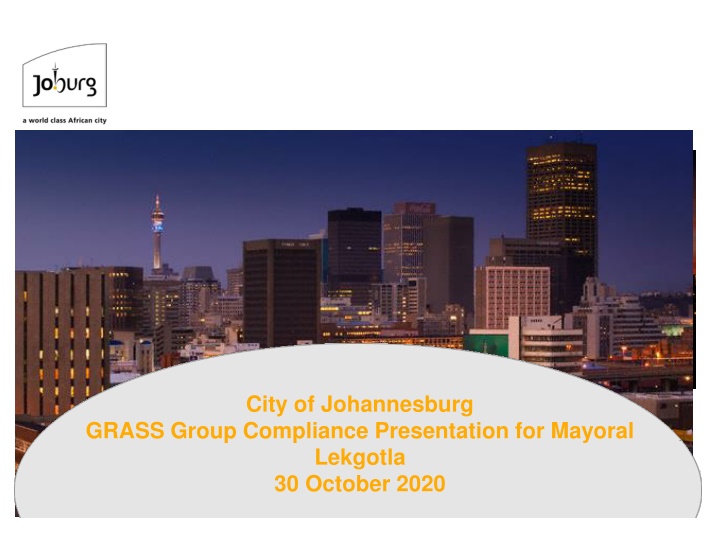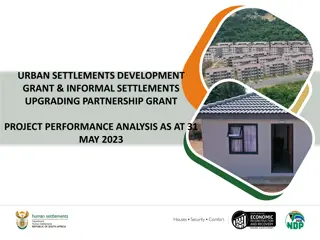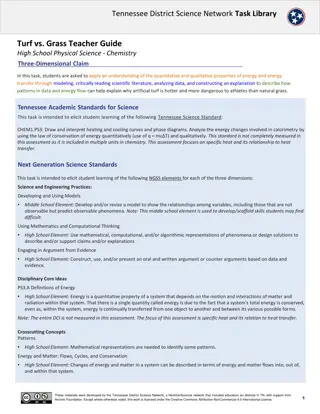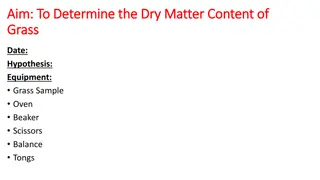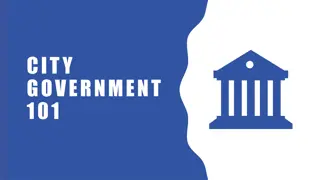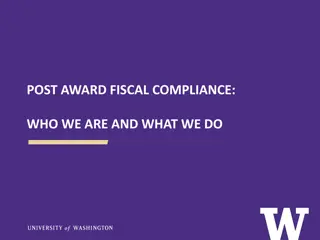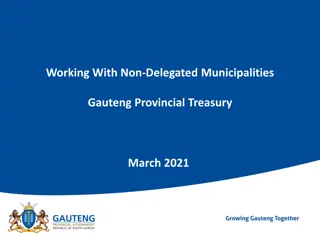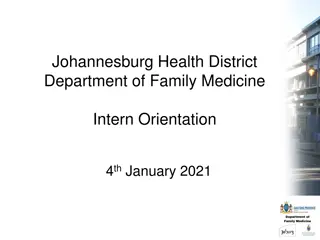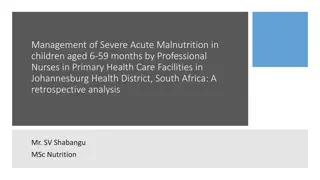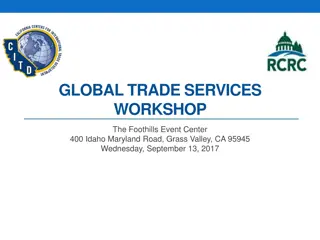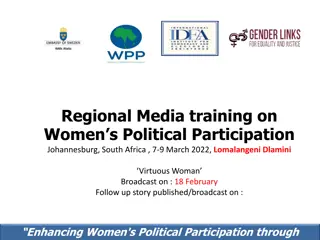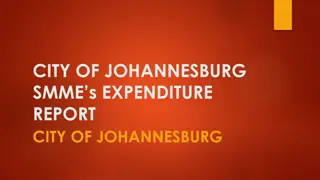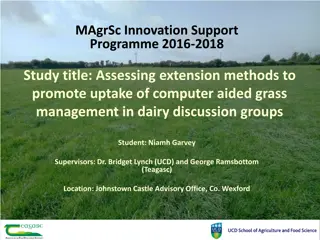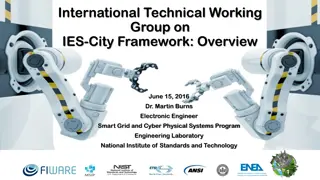City of Johannesburg GRASS Group Compliance Overview
This presentation provides insights into compliance requirements for the City of Johannesburg, focusing on key legislative sources and the establishment of a Compliance Function within local government. It emphasizes the importance of awareness and adherence to regulatory standards at all organizational levels.
Download Presentation

Please find below an Image/Link to download the presentation.
The content on the website is provided AS IS for your information and personal use only. It may not be sold, licensed, or shared on other websites without obtaining consent from the author.If you encounter any issues during the download, it is possible that the publisher has removed the file from their server.
You are allowed to download the files provided on this website for personal or commercial use, subject to the condition that they are used lawfully. All files are the property of their respective owners.
The content on the website is provided AS IS for your information and personal use only. It may not be sold, licensed, or shared on other websites without obtaining consent from the author.
E N D
Presentation Transcript
City of Johannesburg GRASS Group Compliance Presentation for Mayoral Lekgotla 30 October 2020
PRESENTATION OVERVIEW 1. 2. 3. 4. 5. 6. 7. 8. 9. 10. POSSIBLE CAUSES OF UIFW EXPENDITURE IN THE CITY 11. PROBITY ADVISORY SCREENING 12. UTILISATION OF MUNICIPAL SCM REGULATION 36 13. CITY S IMPROVED CONTROLS 14. CITY SCM TURNAROUND STRATEGY AND COMPLIANCE 15. RECOMMENDATIONS TO IMPROVE CITY COMPLIANCE INTRODUCTION AND BACKGROUND CITY S KEY COMPLIANCE REQUIREMENTS COMPLIANCE FUNCTION WITHIN LOCAL GOVERNMENT MANDATE OF GROUP COMPLIANCE UNIT CITY COMPLIANCE MONITORING PROCESSES GROUP COMPLIANCE FRAMEWORK GROUP COMPLIANCE CAPACITY ADVISORY AND MONITORING OF COVID-19 EMERGENCY PRCOUREMENT NON-COMPLIANCE REPORTED BY AGSA
BACKGROUND Although the ultimate responsibility for managing and monitoring compliance with regulatory requirements lies with the Management of the City of Johannesburg, it is however critical that compliance awareness is filtered across all levels within the City, to ensure that every employee is aware and appreciates the need to comply with regulatory requirements. 4
KEY COMPLIANCE REQUIREMENTS Municipal Finance Management Act No.56 of 2003 (MFMA) and the Municipal Systems Act No. 32 of 2000 (as amended) are the primary sources of legislative prescripts for Local Government within SA The key objectives of the MFMA: is secure sound and sustainable management of the financial affairs of municipalities and other institutions in the local sphere of government to establish treasury norms and standards for the local sphere of government provides municipalities with mechanisms and internal controls for establishment of sound financial management CISA: All organisations must comply with applicable laws, rules, codes and standards. In order to achieve this objective, it is necessary to establish a compliance framework and process that is appropriate for the organization 5
COMPLIANCE FUNCTION WITHIN LOCAL GOVERMENT Regulation 14 of the Revised Treasury Regulations: Requires Accounting Officer to ensure that sufficient capacity exists within the institution (City) to prevent, detect and mitigate any non- compliance with the applicable financial management regulatory framework How did the Accounting Officer achieve this: By establishing a Compliance Function in the City with such roles and responsibilities as prescribed by the National Treasury Circulars and Instructions. King III - Compliance structure and appointment of the compliance officer to manage and monitor compliance activities in the organization. King IV - To assist the organization to move beyond a mere compliance (Compliance with the letter of the law) to compliance with the spirit of the law. 6
COMPLIANCE FUNCTION WITHIN LOCAL GOVERNMENT (CONT) Compliance Function must assesses the conformity of the institution (COJ/City) with compliance obligations compliance requirements and commitments The compliance function should be independent and ideally report to the Accounting Officer The concept of Compliance Function independence involves four related elements: Firstly The Function should have formal status within the institution. Secondly - There should be a Compliance Head with overall responsibility for coordinating the monitoring of Compliance Risk. Thirdly - Head of Compliance and Staff should not be placed in a compromise position where there is a perceived or actual conflict of interest Fourthly - Compliance staff must have the required competency to effectively execute the required compliance function role and objectives7
MANDATE OF GROUP COMPLIANCE UNIT Group Compliance provides assurance on the governance of compliance in the City, in accordance with National Treasury MFMA requirements and King 4 Code on Good Governance Supports business, by advising on compliance management processes towards attainment of favourable audit outcomes and the achievement of relevant and strategic KPIs. Providing compliance risk evaluation and advisory, monitoring and reporting services, Periodic review of the City s regulatory universe 8
CITY COMPLIANCE MONITORING PROCESSES Requirements for all City Departments and Entities: All City Departments and Entities are mandated by the Municipal Finance Management Act ( MFMA ), to maintain a system of risk management, compliance management and internal control monitoring and reporting. Group Compliance Support functions are to develop and implement: I. Group Compliance Management Framework II. Group Compliance SOP III. Group Compliance Universe IV. Group Compliance Annual Compliance Monitoring Plan
City and Group Compliance Framework Guide the City (Core and MEs) on the establishment, implementation, evaluation, maintenance and improvement of effective and responsive compliance management processes within the City Enables the City to demonstrate its commitment to compliance with relevant laws, including legislative requirements, industry codes and organisational standards, as well as standards of good corporate governance, best practices, and ethics The framework addresses aspects such as compliance strategy, objectives, governance, roles and responsibilities, process and techniques and reporting. Compliance management must be a standing agenda item at all City governance committee meetings Management must develop and implement action plans to address areas of non- compliance reported by Group Compliance Unit Governance oversight committees must monitor effective resolution of compliance breaches e.g. Any non-compliance, compliance exposure, non- conformance Compliance framework is been aligned with the organization's strategic goals( Mayoral Priorities) 10
Advisory and Monitoring of Covid-19 Emergency Procurement Emergency Procurement Compliance Plan (EPCP) approved in March 2020 Compliance Screening and Reporting of Supplier Quotations commenced in the latter part of March 2020 Screening included review for compliance with relevant NT Covid-19 Emergency Procurement Circulars, Municipal SCM Regulations and City SCM Policy Unit Head for Group Compliance Advisory Services was Chairing the Emergency Expenditure Compliance Monitoring Committee (EECMC), which reported to the City Manager on a weekly basis Compilation of the Emergency Compliance Donations Framework (ECDF) in conjunction with relevant City Departments Ad-hoc Advisories in respect of Implementing Compliance with NT Covid-19 Emergency Procurement Circulars and OHS Workplace Readiness
On 31 March 2020, City Manager approved establishment of COJ COVID 19 Emergency Expenditure Compliance Monitoring Committee (EECMC). Its TOR was also approved on the 31 March 2020 EECMC meeting requires all the Departments representative to attend the meeting The EECMC was chaired by the Unit Head for Group Compliance Advisory Service assisted, as a Secretariat, by Director for Strategic Management Support in GFIS Group Compliance was mandated to screen all COVID procurements from 01 April 2020 until the committee seize to exist. 13
PROCESS OF COMPLIANCE MANAGEMENT PRESCRIBED BY COMPLIANCE INSTITUTE OF SA 5. Compliance Process as prescribed by the Compliance Institute of South Africa (CISA) The compliance process should encompass compliance risk identification, compliance risk assessment, compliance risk management and compliance monitoring. This plays an essential role in assisting management to discharge its responsibility to comply with applicable regulatory requirements. Compliance monitoring may be independent or routine in nature and the level of formality relating to a monitoring engagement will be dependent on the nature thereof. Responsibility for compliance The compliance function is responsible for the compliance process. The process must be approved by top management. The ultimate responsibility for managing and monitoring compliance with regulatory requirements lies with the Management of the City of Johannesburg. 14
PRIORITY REGULATORY REGISTERS AND THE IMPLEMENTATION OF COMPLIANCE RISK 8. MANAGEMENT PLANS Priority regulatory Registers Currently PRR is the document that records a number of core legislative requirements. The PRR is a re-active document, whereby evidence is reviewed after the fact . Compliance Risk Management Plans Main focus of the implementation of the CRMP is to concentrate on key regulatory requirements, that have a material impact on the City when there is non-compliance. The objective of the CRMP is to record control measures to ensure compliance with regulatory requirements, i.e. to prevent non- compliance before it occurs. PRR s will be phased out as CRMP s are implemented.
NON- COMPLIANCE REPORTED BY AGSA 1.IRREGULAR EXPENDITURE Transgression of SCM prescripts 2. The non-compliance relate to irregular expenditure as a results of transgression of the SCM prescripts as follows: Procurement without the following competitive bidding. Procurement without obtaining quotations. Non- compliance with procurement process and Non- compliance with legislation on contract management. 3. Non-compliance with SCM regulations is a recurring matter that continues to be a major challenge in improving the City s audit outcome. 4. Municipal officials are aware of the compliance universe with which they need to comply, however there is still non-compliance with key laws and regulations specifically with the SCM prescripts as evidenced by the number of non-compliance findings issued during the interim audit. 16
10.POSSIBLE CAUSES OF UIFW IN THE CITY The City has recorded an increase In UIFW expenditure in the past financial periods. Possible causes of UIFW expenditure: Varied interpretations of the supply chain management legislative requirements, resulting in improper application thereof during the procurement process. Lack of understanding by staff, with limited training interventions on SCM requirements. Lack of proper internal controls to ensure that competitive bidding processes are followed. False declarations of interest by the City employees resulting in non- compliance with Section 5(1) of the Municipal Systems Act and Regulation 45 of the municipal supply chain management regulations.
11.PROBITY ADVISORY SCREENING The City must be able to demonstrate to stakeholders that it is achieving its regulatory objectives and in a cost-effective manner in compliance with Section 217 of the Constitution. The City needs to develop an effective proactive compliance plan to address patterns of non-compliance, rather than responding only to individual incidents using the routine compliance activities and processes. The City is currently using the traditional enforcement compliance model in achieving compliance which focuses on deterring non-compliance through enforcement action, such as Forensics Investigation.
CITY COMPLIANCE SUGGESTED WAYFORWARD 19
Utilisation of Municipal SCM Regulation 36 Regulation 36 is recognized as other means of procurement of goods and services, however that must be only be done where there will be instances when it would be impractical to invite competitive bids. In this regard, Treasury Regulation 16A6.4 provides for such instances where Accounting Officers or Accounting Authorities are allowed to dispense with competitive bidding processes to procure goods and services by other means. This provision is intended for cases of emergencies where immediate action is necessary or if the goods and services required are produced or available from sole service providers. The reasons for such action must be recorded and approved by the Accounting Officer or Accounting Authority.
Utilisation of Regulation 36 This practice of procuring goods and service through Regulation 36 deviations is opening-up room for non-compliance with SCM process and Section 217 of the Constitution, and it also promotes the exclusion of other service providers to participate in the bidding process for City. Interventions Identified by City Manager: Requests to utilise Regulation 36 needs to be adequately reviewed by Group Compliance Unit to enable full compliance to its requirements. A review of ToRs or Bid Specifications before approval by the Accounting Officer for advertisement 21
Utilisation of Regulation 36 Deviations from normal competitive bidding process are exceptional. However, the number of regulation 36 deviation reports submitted for compliance assessment in the past weeks demonstrated the level of poor planning by Core departments and Municipal entities. Regulation 36 deviations process in City appear to be a norm rather than an exception, and this will result in City s institutionalization of procurement goods and services through Regulation 36 deviations which is divergent to Section 217 of the Constitution. 22
PROBITY ADVISORY SCREENING OF REGULATION 36 DEVIATIONS AND TOR All TOR s/Bid Specifications is reviewed before approval by the City Manager All requests to the Accounting Officer, in terms of regulation 36 deviations is thoroughly scrutinized before approval by accounting officer. Most procurement deviations submitted by departments and entities are based on MSCM Regulations 36(1)(a)(i) & (v). All regulation 36 deviation procurement requests are assessed as way of pro-actively preventing future audit findings, UIFW and loss of reputation. To assess whether the SCM regulation 36 is justifiable or the competitive bidding process should have been followed had there be proper planning. Group Compliance is developing a checklist to assist the departments and entities in monitoring compliance on Regulation 36 deviations as set out in Section 217 of the Constitution of South Africa, City s SCM policy and other applicable legislation 23
CITYS CURRENT AND IMPROVED CONTROLS City has made it a mandatory: For all tenders above R5 million, probity advisory and probity audit are being conducted from Bid Specification Committee before tender is advertised. This also done immediately after Bid Evaluation Committee (BEC) has finalised its work. City Manager also request probity advisor and probity auditor to review the final award before approving it Group Compliance Unit is also tasked with review of other SCM procurement before they are being processed. To compliment probity advisory and probity audit, legal advisory is also requested with respect to certain tenders SCM processes has been inter-linked with City s demand planning process 24
Citys SCM Turnaround Strategy and Compliance SUPPORT FOR CITY S SCM PROCUREMENT TURNAROUND STRATEGY Supply chain compliance risk is one of the significant challenges in the City due to potential non compliance during the procurement process City must put in place the Compliance Management System (CMS) within the Centre of Supply Chain and Procurement Process to ensure that specific compliance risks are addressed City to minimise or avoid the following compliance risks: Risk of regulatory non-compliance and impaired reputation Ethical or non-compliance issues with suppliers or sub-suppliers, Escalation of UIFW expenditure As a leading metropolitan municipality, the City must make the CMS a priority in its Turnaround Strategy for Supply Chain Management 25
COMPLIANCE SUPPORT TO SCM TURNAROUND STRATEGY Procurement and Operational. Procurement related processes associated with compliance, while operational compliance procurement is not directly responsible for but may support at some level. compliance includes all procurement CMS includes all others that Compliance within the City s procurement processes will contribute to overcoming some of the key management challenges in this area, such as building credibility and preventing fraud CMS Perform all functions according to strategic and pro- active management principles CMS
COMPLIANCE ASSESSMENT DIAGNOSTIC ANALYSIS Diagnosis of City s SCM business processes in line with City Compliances Universe, Compliance Checklists, Templates, Tracking Registers and SOPs SCM Business Analysis Positioning Group Compliance Unit as function integrated to support the compliance of SCM processes. Screening and checking of every stage of procurement bids (tender/quotation processes prior to awarding. This will greatly assist to reduce UIFW expenditure within the City Group Compliance to perform all functions of supporting the SCM process such as screening of MSCM Regulation 32 and 36 requests pro-actively rather than reactively to support compliance with the supply chain management principles and regulatory requirements SCM Control Measures SCM Control Improvement : To Capacitate the Group Compliance Unit as support to the SCM functions to ensure compliance and enhance service delivery in line with Section 217 of the Constitution Capacitating the Group Compliance Unit Structure
SCM BUSINESS OPERATIONAL AND COMPIANCE UNIT SUPPORT GROUP COMPLIANCE UNIT ACTIVITIES ACTIVITY EXAMPLES Probity advisory prior to the appointment or finalisation of the supply chain management procurement process Compliance advisory of procurement TOR prior to the approval by Accounting Officer for advertisement Collaboration between Reviewing and Screening of all appointment of MSCM Regulation 32 and Lack of compliance with basic legislative requirements Strategic SCM Unit and the GRAS Compliance Unit 36 for value for money against previous contracts, as well as performing a market analysis specifically for the items being sourced for the City Development of the Compliance Risk Management Plan (CRMP) for SCM transversal contracts Develop CRMPs for SCM Transversal Contracts in line with Section 112 of MFMA
RECOMMENDATIONS TO IMPROVE COMPLIANCE 1. COJ to implement the Internal Controls as critical mechanism to maintaining Financial and SCM Compliance Programs. 2. COJ to develop the Compliance risk prevention practices and effective internal controls mechanism for operations, finance, HR, strategy, and legal to ensure all corporate compliance obligations are met. 3. COJ to standardized and automated with workflow management systems . 4. COJ to develop and approved a CONSEQUENCE MANAGEMENT FRAMEWORK, also known as a compliance policy, is an internal system or process that outlines an organization's approach to managing compliance and mitigating compliance risk.
Conclusion 30
